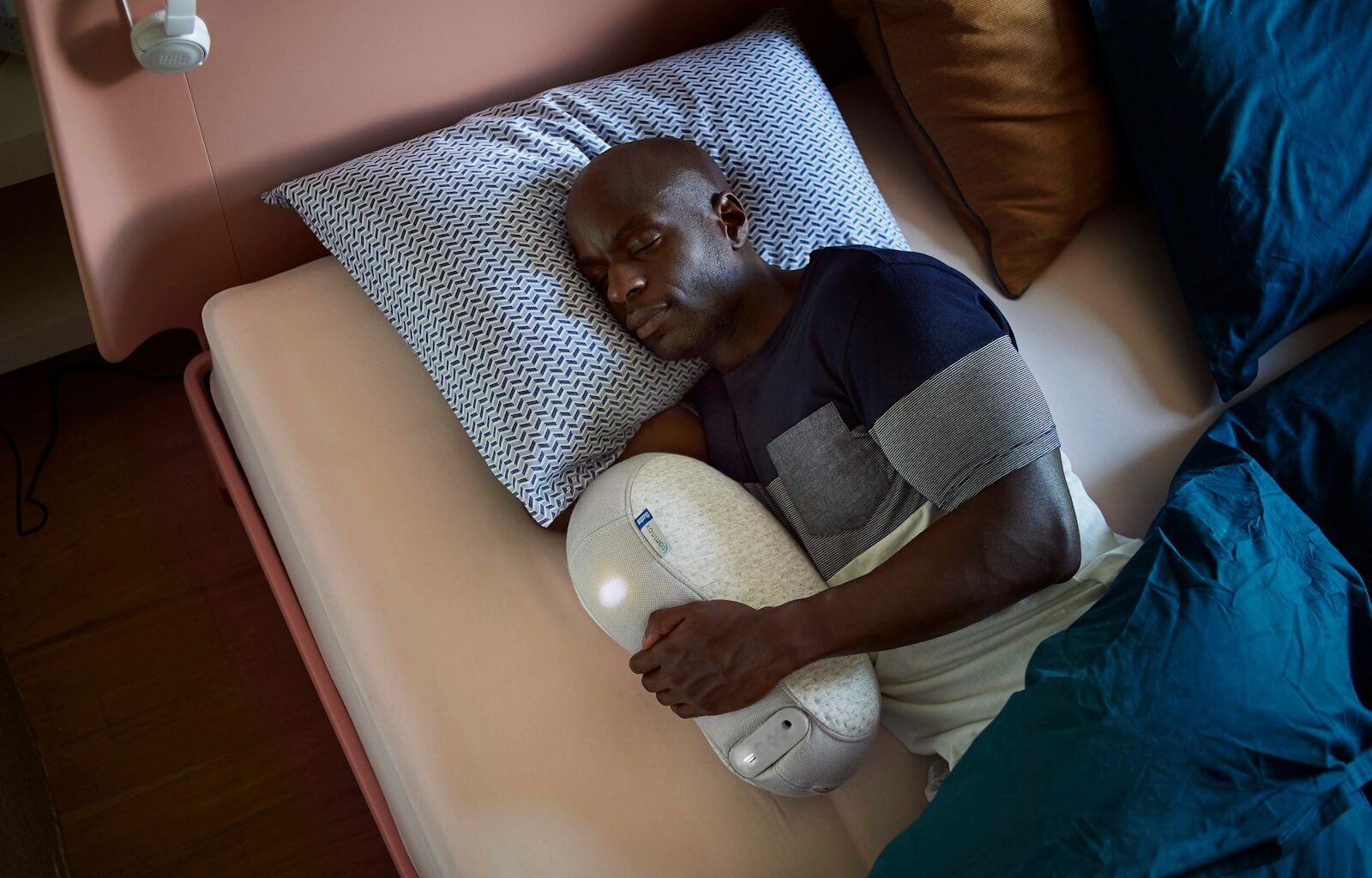Quality sleep drives muscle recovery, hormone optimization, and metabolic function that determine fitness success more than exercise intensity or duration alone.
Research from Stanford University shows that athletes who increase sleep to 8+ hours nightly improve performance by 23% on average, while sleep-deprived individuals lose 60% more muscle mass during weight loss and show 55% reduced fat burning efficiency compared to well-rested counterparts.
1. Muscle Recovery and Growth Hormone Production
1.1 Deep Sleep and Growth Hormone Release
Growth hormone production peaks during deep sleep phases, with 70% of daily growth hormone secreted during the first few hours of sleep. This hormone drives muscle protein synthesis, tissue repair, and recovery processes essential for fitness improvements and adaptation to training stress.
1.2 Muscle Protein Synthesis Optimization
Sleep quality directly affects muscle protein synthesis rates, with poor sleep reducing muscle building by up to 18% even when protein intake remains adequate. Quality sleep enables muscles to rebuild stronger after training while poor sleep prevents adaptation and recovery.
1.3 Inflammation Reduction and Recovery Acceleration
Adequate sleep reduces systemic inflammation markers that interfere with recovery and performance. Sleep-deprived individuals show elevated C-reactive protein and other inflammatory markers that slow healing and increase injury risk.
1.4 Cellular Repair and Mitochondrial Function
Sleep enables cellular repair processes and mitochondrial regeneration that improve energy production and endurance capacity. Well-rested athletes show superior oxygen utilization and energy efficiency compared to sleep-deprived counterparts.
2. Hormonal Balance and Metabolic Regulation
2.1 Cortisol Regulation and Stress Management
Sleep normalizes cortisol rhythms, with poor sleep causing chronically elevated stress hormones that promote muscle breakdown and fat storage. Proper sleep timing and duration maintain healthy cortisol patterns that support recovery and body composition goals.
2.2 Insulin Sensitivity and Blood Sugar Control
Sleep loss reduces insulin sensitivity by 25-30%, impairing glucose metabolism and promoting fat storage even with identical diets. Quality sleep maintains metabolic flexibility and glucose control essential for body composition improvements.
2.3 Testosterone and Reproductive Hormone Optimization
Sleep directly affects testosterone production, with sleep loss reducing levels by 10-15% within one week. Optimal testosterone levels support muscle building, strength gains, and recovery in both men and women.
2.4 Thyroid Function and Metabolic Rate
Sleep deprivation suppresses thyroid hormone production, reducing metabolic rate and making weight loss more difficult. Adequate sleep maintains thyroid function and metabolic efficiency necessary for achieving body composition goals.
3. Appetite Regulation and Food Choice Impact
3.1 Leptin and Ghrelin Hormone Balance
Sleep loss disrupts hunger hormones, reducing leptin (satiety hormone) by 18% and increasing ghrelin (hunger hormone) by 28%. This hormonal imbalance creates increased appetite and cravings that sabotage nutrition goals.
3.2 Reward System and Craving Control
Sleep deprivation hyperactivates brain reward centers, making high-calorie foods more appealing while reducing willpower and decision-making capacity. Well-rested individuals make better food choices and show improved portion control.
3.3 Late-Night Eating and Circadian Disruption
Poor sleep often leads to late-night eating that disrupts circadian rhythms and promotes weight gain. Proper sleep timing aligns eating patterns with natural metabolic rhythms for optimal nutrient utilization.
3.4 Nutrient Absorption and Digestive Health
Sleep quality affects digestive function and nutrient absorption, with poor sleep reducing the body’s ability to utilize nutrients effectively for recovery and performance improvements.
4. Exercise Performance and Training Adaptation
4.1 Power Output and Strength Performance
Sleep loss reduces peak power output, strength, and explosiveness by 15-20% within days. Athletes consistently sleeping 7+ hours show superior performance metrics and training adaptations compared to sleep-deprived peers.
4.2 Endurance Capacity and VO2 Max
Cardiovascular performance suffers significantly with inadequate sleep, reducing endurance capacity and VO2 max efficiency. Well-rested individuals maintain higher exercise intensities and show better cardiovascular adaptations to training.
4.3 Coordination and Motor Learning
Sleep consolidates motor learning and movement patterns practiced during training. Athletes who sleep adequately after skill practice show superior technique retention and coordination improvements.
4.4 Reaction Time and Athletic Performance
Sleep loss impairs reaction time, decision-making speed, and athletic coordination that affect performance in sports and exercise activities. Quality sleep maintains neural function necessary for optimal movement quality and safety.
5. Injury Prevention and Recovery Optimization
5.1 Tissue Healing and Collagen Synthesis
Sleep drives collagen production and tissue repair processes essential for injury recovery and prevention. Sleep-deprived athletes show 70% higher injury rates and slower healing times compared to well-rested counterparts.
5.2 Immune Function and Illness Prevention
Sleep supports immune function that prevents illness and maintains training consistency. Sleep loss increases illness risk by 300% while reducing vaccine effectiveness and infection recovery speed.
5.3 Balance and Proprioception Maintenance
Adequate sleep maintains balance, coordination, and proprioceptive function that prevent injuries during training and daily activities. Sleep deprivation impairs these protective mechanisms significantly.
5.4 Pain Tolerance and Recovery Perception
Sleep quality affects pain perception and recovery feelings, with poor sleep lowering pain tolerance and increasing perceived effort during exercise. Quality sleep improves exercise tolerance and recovery sensation.
6. Mental Performance and Motivation Factors
6.1 Willpower and Decision-Making Capacity
Sleep deprivation reduces prefrontal cortex function, impairing willpower and decision-making abilities necessary for maintaining exercise and nutrition routines. Well-rested individuals show superior adherence to fitness programs.
6.2 Motivation and Goal Persistence
Quality sleep maintains motivation and goal-directed behavior, while sleep loss reduces exercise motivation and increases likelihood of skipping workouts. Sleep directly affects long-term adherence to fitness routines.
6.3 Stress Tolerance and Emotional Regulation
Adequate sleep improves stress management and emotional regulation that support consistent healthy behaviors. Sleep-deprived individuals show increased emotional eating and stress-driven behavior patterns.
6.4 Focus and Training Quality
Sleep affects attention and focus during workouts, with well-rested individuals maintaining better form, following programs more precisely, and getting superior results from training time investment.
7. Sleep Optimization Strategies for Fitness Success
7.1 Sleep Hygiene and Environment Optimization
Create consistent sleep schedules, dark cool sleeping environments, and pre-sleep routines that promote quality rest. Remove electronic devices, maintain 65-68°F temperatures, and use blackout curtains for optimal sleep conditions.
7.2 Nutrition Timing and Sleep Quality
Avoid large meals, caffeine, and alcohol 3-4 hours before bedtime while ensuring adequate protein intake supports overnight recovery. Light protein snacks before bed can support muscle protein synthesis during sleep.
7.3 Exercise Timing and Sleep Impact
Schedule intense exercise at least 3 hours before bedtime while using gentle movement or stretching as part of evening routines. Morning or afternoon exercise generally improves sleep quality better than evening workouts.
7.4 Stress Management and Recovery Practices
Implement stress reduction techniques, meditation, or relaxation practices that improve sleep quality and recovery. Chronic stress interferes with sleep and undermines fitness progress through multiple pathways.
Conclusion
Sleep represents the foundation of fitness success, affecting every aspect of training adaptation, recovery, and body composition through hormonal optimization, metabolic regulation, and performance enhancement.
Prioritizing 7-9 hours of quality sleep nightly provides greater fitness benefits than most supplements or training modifications while supporting long-term adherence and motivation. The most effective fitness programs integrate sleep optimization with exercise and nutrition planning, recognizing that recovery determines adaptation and progress.
Focus on consistent sleep schedules, optimal sleep environments, and stress management practices that support quality rest. Your fitness goals depend more on what happens during sleep than during your workouts—make sleep the foundation of your health and fitness strategy.












